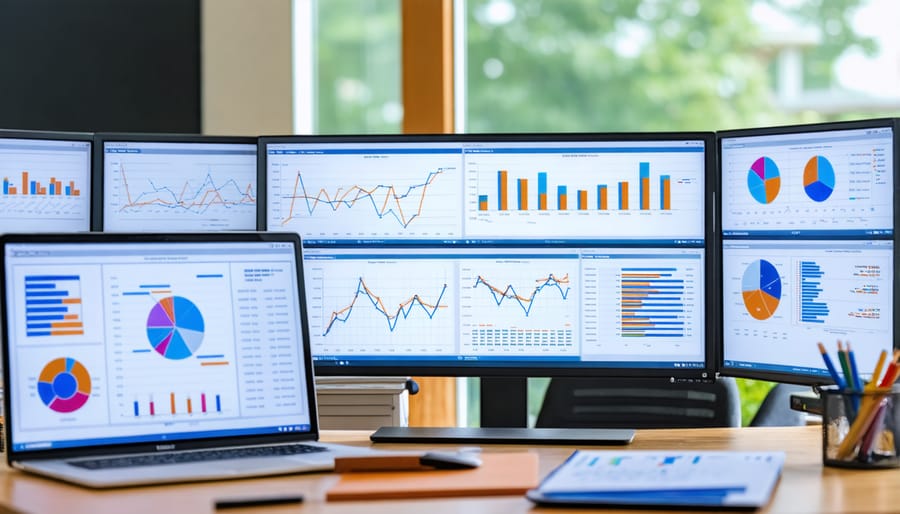Property and real estate managers stand at the intersection of asset optimization, tenant satisfaction, and financial performance in today’s dynamic real estate market. These professionals orchestrate complex operations that transform buildings into high-performing investments while ensuring seamless experiences for occupants.
Leading a $10.6 trillion commercial real estate industry in the United States alone, property managers leverage sophisticated technology platforms, market analytics, and relationship management skills to maximize asset value. Their strategic oversight encompasses everything from daily operations and maintenance to long-term capital improvements and sustainability initiatives.
Modern property management has evolved far beyond traditional rent collection and repairs. Today’s managers must navigate emerging PropTech solutions, shifting tenant expectations, ESG requirements, and complex regulatory landscapes. They serve as crucial intermediaries between property owners, tenants, service providers, and local authorities, requiring exceptional communication and problem-solving capabilities.
As real estate portfolios become increasingly complex and stakeholder demands intensify, skilled property managers deliver measurable value through operational efficiency, risk mitigation, and strategic asset positioning. Their expertise directly impacts property performance, tenant retention rates, and ultimately, investment returns.
Core Responsibilities That Drive Property Value
Financial Management and Revenue Optimization
Financial management is a cornerstone of successful property operations, requiring meticulous attention to budgeting, revenue optimization, and cash flow management. Property managers must develop comprehensive annual budgets that account for operating expenses, maintenance costs, capital improvements, and projected income while maintaining adequate reserves for unexpected expenditures.
Rent collection and lease administration form critical components of revenue management. Modern property managers utilize automated payment systems and sophisticated software solutions to streamline rent collection, track payment histories, and manage security deposits. These tools also help identify trends in payment behavior and potential revenue leakage points.
Financial reporting requires regular analysis of key performance indicators (KPIs) such as occupancy rates, net operating income (NOI), and return on investment (ROI). Managers prepare detailed monthly and quarterly reports for property owners, highlighting variance analyses, expense trends, and recommendations for performance improvement.
Value-adding strategies play an essential role in maximizing property returns. This includes implementing strategic rental rate adjustments based on market analysis, identifying opportunities for additional revenue streams through amenity upgrades or service offerings, and optimizing operational efficiency to reduce costs. Successful managers also evaluate potential capital improvements that can increase property value and justify higher rental rates.
Risk management considerations include maintaining appropriate insurance coverage, establishing emergency funds, and developing contingency plans for economic downturns or unexpected market changes. Regular financial audits and compliance checks ensure adherence to accounting standards and regulatory requirements.

Maintenance and Property Preservation
Property and real estate managers must implement comprehensive maintenance and preservation strategies to protect asset value and ensure tenant satisfaction. This involves developing systematic preventive maintenance schedules, coordinating repairs, and overseeing property improvements that enhance both functionality and market appeal.
Preventive maintenance programs typically include regular inspections of building systems, including HVAC, electrical, plumbing, and structural components. Managers must schedule routine services like filter replacements, equipment calibration, and safety system checks to prevent costly breakdowns and extend the lifecycle of building components.
When repairs are necessary, property managers coordinate with qualified contractors, obtain competitive bids, and oversee work quality. This requires maintaining a network of reliable service providers and ensuring all maintenance activities comply with building codes and safety regulations.
Property improvements represent strategic investments in asset value. Managers evaluate potential upgrades based on ROI potential, market demands, and building lifecycle considerations. Common improvements include energy efficiency upgrades, modernization of common areas, and implementation of smart building technologies.
Documentation plays a crucial role in maintenance management. Managers maintain detailed records of all maintenance activities, repairs, and improvements, creating a comprehensive property history that aids in future planning and demonstrates proper asset stewardship to owners.
Successful maintenance programs require careful budget allocation, with managers typically establishing reserve funds for both routine maintenance and capital improvements. This financial planning ensures properties remain competitive while protecting long-term asset value.
Technology Integration in Modern Property Management
Property Management Software Solutions
Modern property management software solutions have revolutionized how real estate managers handle their daily operations. These sophisticated platforms integrate multiple functions, from tenant communication and maintenance scheduling to financial reporting and compliance monitoring, into unified dashboard interfaces.
Leading solutions like Yardi, AppFolio, and Buildium offer comprehensive features including automated rent collection, real-time maintenance request tracking, and sophisticated analytics tools for performance monitoring. Cloud-based systems enable property managers to access critical information remotely, facilitating faster decision-making and improved operational efficiency.
Advanced AI and machine learning capabilities now power predictive maintenance algorithms, helping managers anticipate equipment failures and schedule preventive maintenance more effectively. These systems can analyze historical data to optimize rental pricing strategies and identify potential revenue opportunities across property portfolios.
Integration capabilities with IoT devices and smart building systems allow for real-time monitoring of building systems, energy consumption, and security features. Mobile applications extend functionality to field operations, enabling staff to update work orders, conduct inspections, and document property conditions instantly.
The most effective platforms also incorporate robust reporting tools that generate detailed financial statements, occupancy reports, and compliance documentation, streamlining audit processes and ensuring regulatory adherence. This technological evolution has transformed property management from a reactive to a proactive discipline, enabling managers to optimize asset performance while reducing operational costs.
Smart Building Integration
In today’s rapidly evolving property management landscape, IoT smart buildings have become a cornerstone of efficient asset management. Property managers are increasingly leveraging advanced building automation systems (BAS) to optimize operations, reduce energy consumption, and enhance tenant experience.
These integrated systems connect various building components through a centralized platform, enabling real-time monitoring and control of HVAC systems, lighting, security, and access control. Smart sensors throughout the building collect data on occupancy patterns, temperature variations, and energy usage, allowing managers to make data-driven decisions for resource allocation and maintenance scheduling.
Predictive maintenance algorithms analyze equipment performance data to forecast potential issues before they become critical, significantly reducing downtime and repair costs. Energy management systems automatically adjust building operations based on occupancy levels and time of day, resulting in substantial cost savings and improved sustainability metrics.
Modern property managers must also consider the integration of mobile applications that provide tenants with direct control over their space environment and easy communication channels with management. These technologies not only improve operational efficiency but also contribute to higher tenant satisfaction and retention rates, ultimately increasing property value and ROI.
The implementation of smart building technologies requires careful planning, considering factors such as system compatibility, cybersecurity measures, and staff training needs. Successful integration depends on selecting appropriate solutions that align with both current requirements and future scalability needs.

Sustainable Property Management Practices
Modern property managers increasingly recognize that implementing sustainable property management practices is not just environmentally responsible but also financially advantageous. Energy efficiency initiatives have become cornerstone strategies for reducing operational costs while enhancing property value and tenant satisfaction.
Leading property managers are adopting comprehensive sustainability programs that include smart building technologies, energy-efficient HVAC systems, and automated lighting controls. These systems can reduce energy consumption by 20-30% while providing detailed usage analytics for continuous optimization. Water conservation measures, such as low-flow fixtures and smart irrigation systems, typically achieve 15-20% reduction in water consumption.
Waste management and recycling programs have evolved beyond basic sorting to include comprehensive waste audit systems and circular economy initiatives. Progressive properties now implement composting programs and partner with local recycling facilities to maximize diversion rates from landfills.
Building envelope improvements, including high-performance windows, enhanced insulation, and cool roofing systems, play crucial roles in energy conservation. These upgrades not only reduce heating and cooling costs but also extend the lifespan of HVAC equipment and improve indoor comfort levels.
Green certification programs like LEED, BREEAM, and ENERGY STAR provide frameworks for implementing and measuring sustainable practices. Properties achieving these certifications often command premium rents and attract environmentally conscious tenants, resulting in higher occupancy rates and stronger returns on investment.
Successful sustainability initiatives require engagement from all stakeholders. Property managers must educate tenants about energy-saving practices, implement clear sustainability policies, and regularly monitor and report on environmental performance metrics. This collaborative approach ensures long-term success and demonstrates commitment to environmental stewardship while maintaining profitable operations.
Risk Management and Compliance
Effective risk management and compliance are cornerstone responsibilities for property and real estate managers, requiring a comprehensive approach to protect assets and stakeholders. These professionals must maintain thorough knowledge of local, state, and federal regulations while implementing robust risk mitigation strategies across their portfolio.
Insurance coverage forms the first line of defense, with managers needing to secure appropriate policies including property insurance, general liability coverage, and professional liability protection. Additional specialized coverage may be necessary depending on property type, location, and specific risk factors. Regular insurance audits ensure adequate protection against potential losses and liabilities.
Regulatory compliance demands careful attention to building codes, safety standards, and environmental regulations. Managers must establish systematic approaches to maintain compliance, including regular property inspections, documentation of maintenance activities, and prompt addressing of violations. Environmental considerations, particularly concerning hazardous materials and waste management, require specialized knowledge and careful oversight.
Property management agreements must clearly outline risk allocation between parties, establishing responsibilities for maintenance, repairs, and liability. These agreements serve as crucial risk management tools, defining insurance requirements and compliance obligations for all stakeholders.
Effective risk management also encompasses:
– Regular safety audits and risk assessments
– Emergency response planning and disaster preparedness
– Tenant screening and background checks
– Documentation and record-keeping protocols
– Staff training on safety procedures and compliance requirements
Technology plays an increasingly important role in risk management, with software solutions helping track compliance deadlines, maintain inspection records, and monitor security systems. These tools enable proactive risk management and provide audit trails for regulatory compliance.
Modern property managers must also address emerging risks, including cybersecurity threats to building systems, climate-related challenges, and evolving regulatory requirements. Staying current with industry best practices and maintaining strong relationships with risk management professionals helps ensure comprehensive protection for managed properties.

Future Trends Reshaping Property Management
The property management landscape is undergoing significant transformation driven by technological advancement and evolving market demands. Artificial Intelligence and Machine Learning are revolutionizing how managers handle tenant relationships, maintenance scheduling, and property analytics. Smart building technologies are becoming increasingly prevalent, enabling real-time monitoring of building systems and predictive maintenance capabilities.
Sustainability and energy efficiency have emerged as critical priorities, with property managers implementing green building practices and achieving certifications to meet both regulatory requirements and tenant expectations. The integration of IoT devices for building automation is streamlining operations while reducing operational costs and environmental impact.
Digital transformation is reshaping tenant interactions through mobile apps and online portals, providing seamless communication channels and automated service request systems. Virtual and augmented reality technologies are transforming property showings and maintenance training, allowing for remote property tours and enhanced maintenance guidance.
The rise of flexible workspaces and mixed-use developments is creating new challenges and opportunities for property managers. These evolving property models require innovative approaches to space utilization, tenant mix optimization, and community building.
Data analytics and business intelligence tools are becoming essential for strategic decision-making, enabling managers to optimize rental pricing, predict market trends, and enhance portfolio performance. Blockchain technology is gradually being adopted for smart contracts and property transactions, promising increased transparency and efficiency in property management operations.
Looking ahead, successful property managers will need to embrace these technological innovations while maintaining strong interpersonal skills. The focus will increasingly shift toward creating experiential environments that enhance tenant satisfaction and property value while ensuring operational efficiency and sustainability.
Property and real estate managers have evolved from traditional building custodians to strategic asset management professionals. Their role now encompasses a complex blend of operational expertise, financial acumen, and technological proficiency. As the real estate landscape continues to transform, successful property managers must adapt to emerging trends while maintaining core competencies in tenant relations, maintenance oversight, and regulatory compliance.
The integration of smart building technologies, sustainability initiatives, and data-driven decision-making has revolutionized how properties are managed. Modern property managers serve as crucial intermediaries between owners, tenants, and service providers, ensuring optimal asset performance and value appreciation. Their ability to leverage advanced property management software, implement energy-efficient solutions, and respond to changing market demands has become essential for maximizing returns on investment.
Looking ahead, the profession will continue to demand increasingly sophisticated skills as buildings become more technologically advanced and tenant expectations evolve. The successful property manager of tomorrow will need to balance traditional management principles with innovative approaches to create sustainable, efficient, and profitable real estate assets. Their role remains fundamental to the success of real estate investments and the satisfaction of all stakeholders involved.

